Blog
How to Stop a Dog from Chewing His Bed
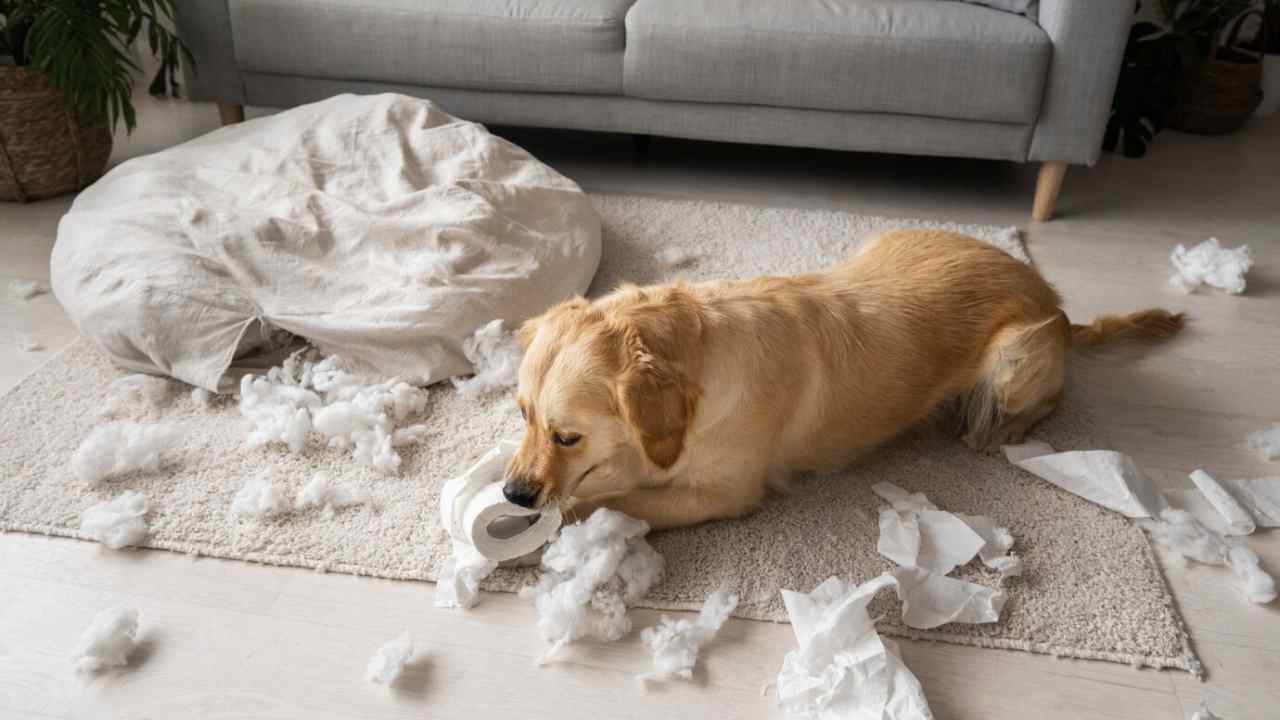
Investing in a plush bed for your dog only to find it torn apart can be pretty aggravating. However, instead of expressing anger towards your furry friend, it’s essential to comprehend the reasons behind their bed-chewing behaviour.
The good news is, with a little detective work, you can figure out why your pup is chewing and stop the destruction!
Please continue reading to learn strategies for stopping dogs from chewing their beds.
Contents
Why Dogs Chew Up Their Beds
Understanding the reasons behind dogs chewing their beds is crucial before delving into solutions to prevent this behaviour. Let’s examine the primary factors contributing to this issue:
1. Anxiety and Boredom
One of the foremost reasons dogs resort to chewing their beds is due to feelings of anxiety and boredom.
A lack of regular physical activity and mental engagement can lead dogs to seek attention through destructive behaviours. This is especially true in environments where the pet owner is frequently absent or too busy, leaving the dog without sufficient stimulation or companionship.
Certain breeds may have a heightened susceptibility to separation anxiety, potentially intensifying the problem.
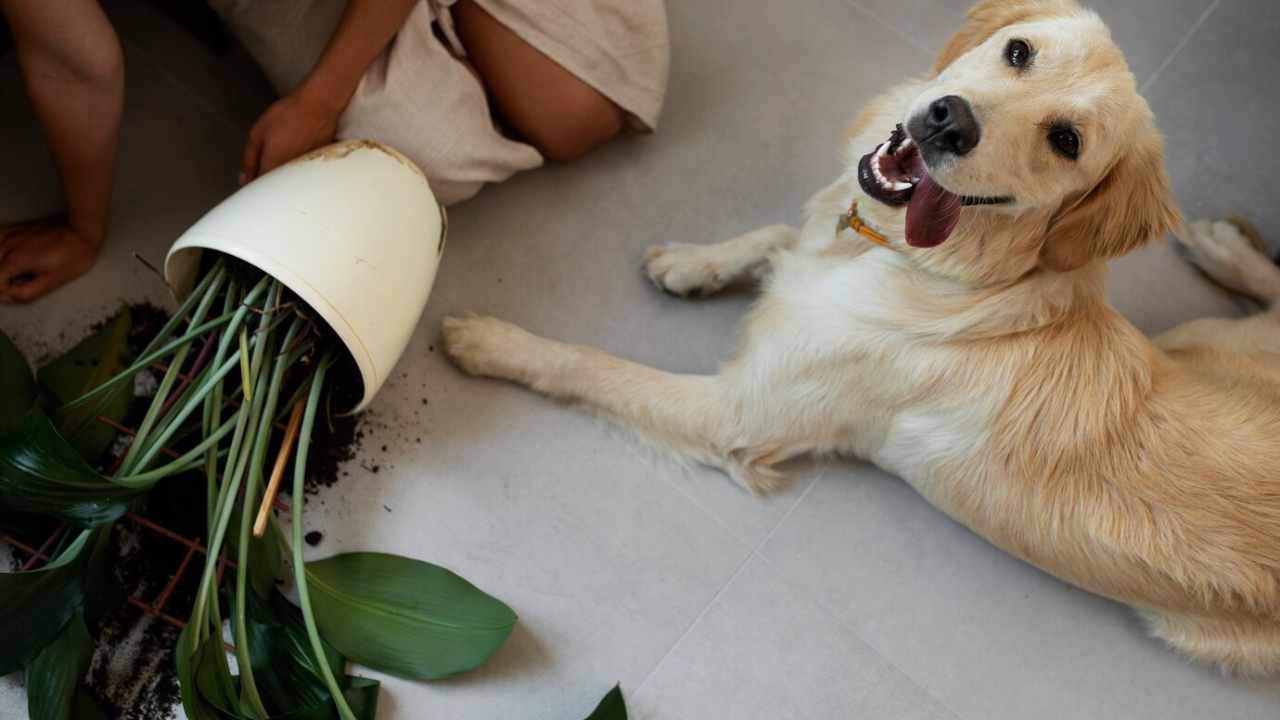
2. Hunger
Another factor to consider is hunger. Dogs under a calorie-restricted diet might use destructive chewing to scavenge for additional sources of nutrition. While a dog bed is not a food source, the scent of food on or near the bed might trigger this behaviour.
Hunger-driven chewing is a sign that the dog’s dietary needs may not be fully met, prompting them to chew on various objects for sustenance.
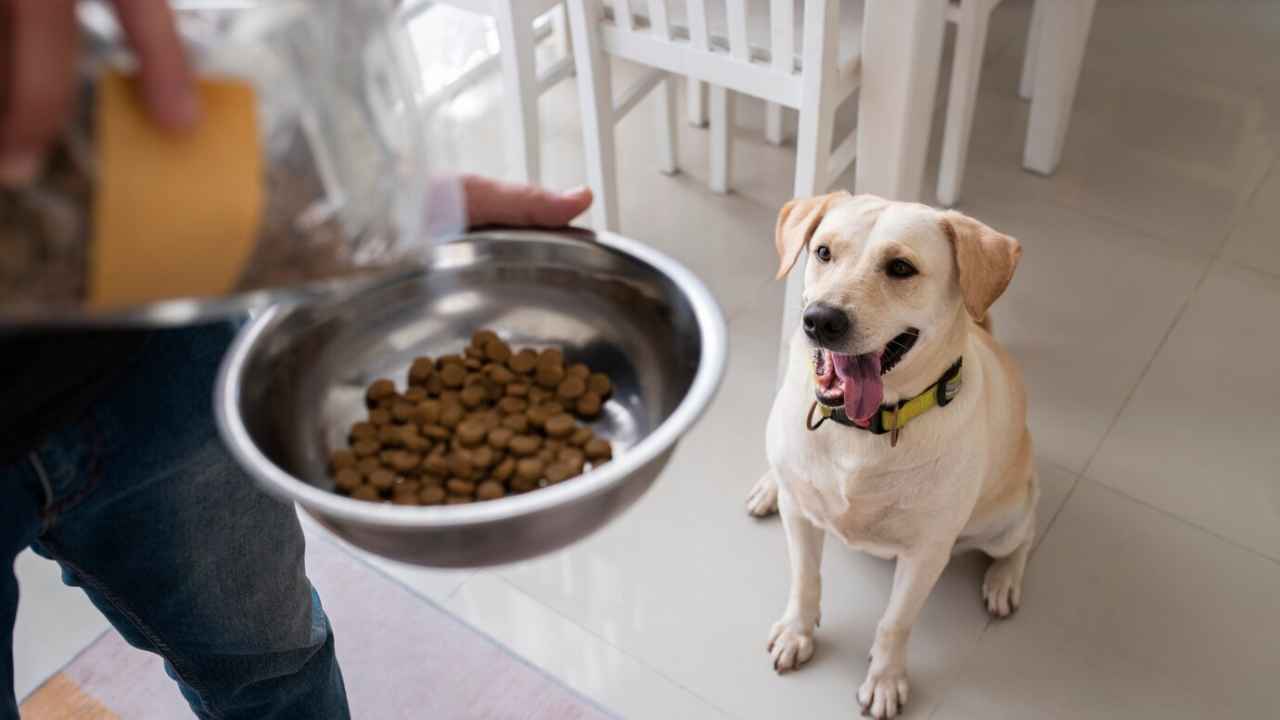
3. Underlying Health Issues
If bed chewing is new behaviour not explained by insufficient activity or stimulation, consider whether your dog may have an underlying health issue. Consult your vet if you have any concerns about new gastrointestinal problems or potential obsessive chewing disorders.
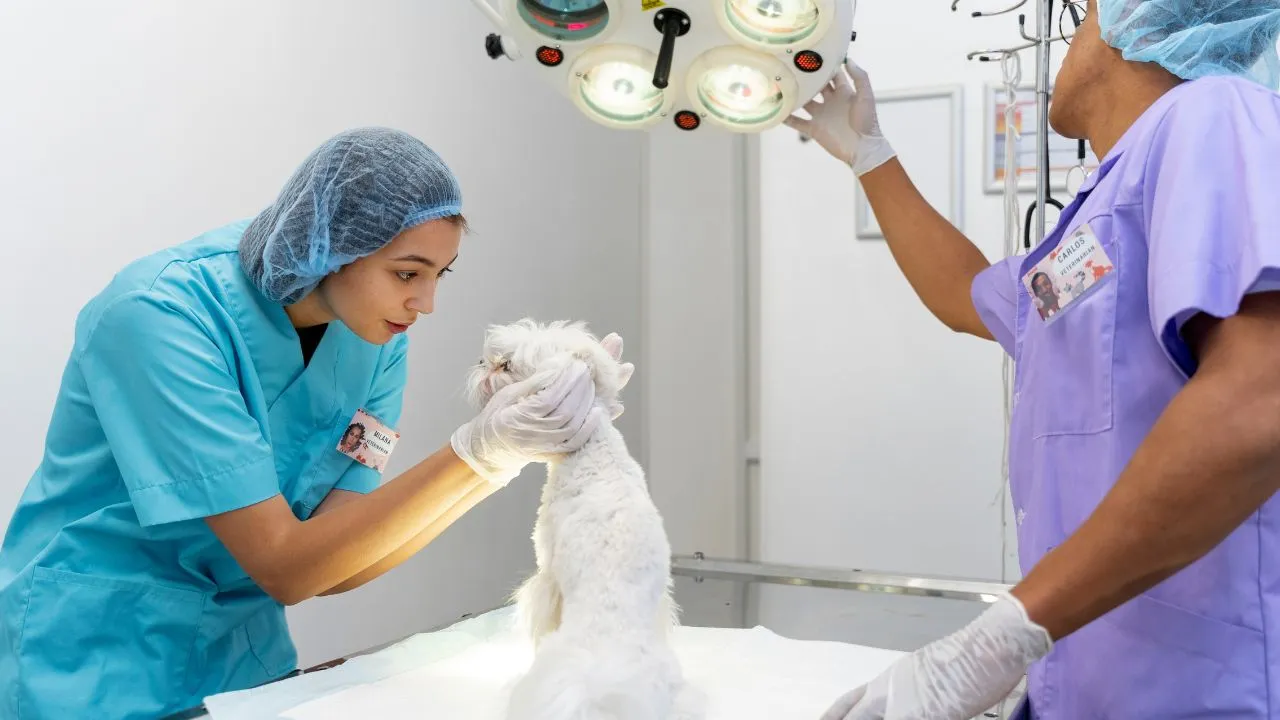
4. Teething
For puppies, chewing can often be attributed to teething. Puppies, particularly between four and six months of age, will chew instinctively to facilitate the eruption of their teeth.
Chewing helps alleviate the discomfort associated with the growth of new teeth and the tenderness in their gums.

5. Instinct and Exploration
Beyond the reasons above, many dogs chew on their beds to explore. Like human infants, puppies use their mouths to learn about their environment. This behaviour can be a part of their instinctual need to understand their surroundings, akin to cats scratching.
Hence, adjusting your expectations regarding your dog’s chewing habits is essential.
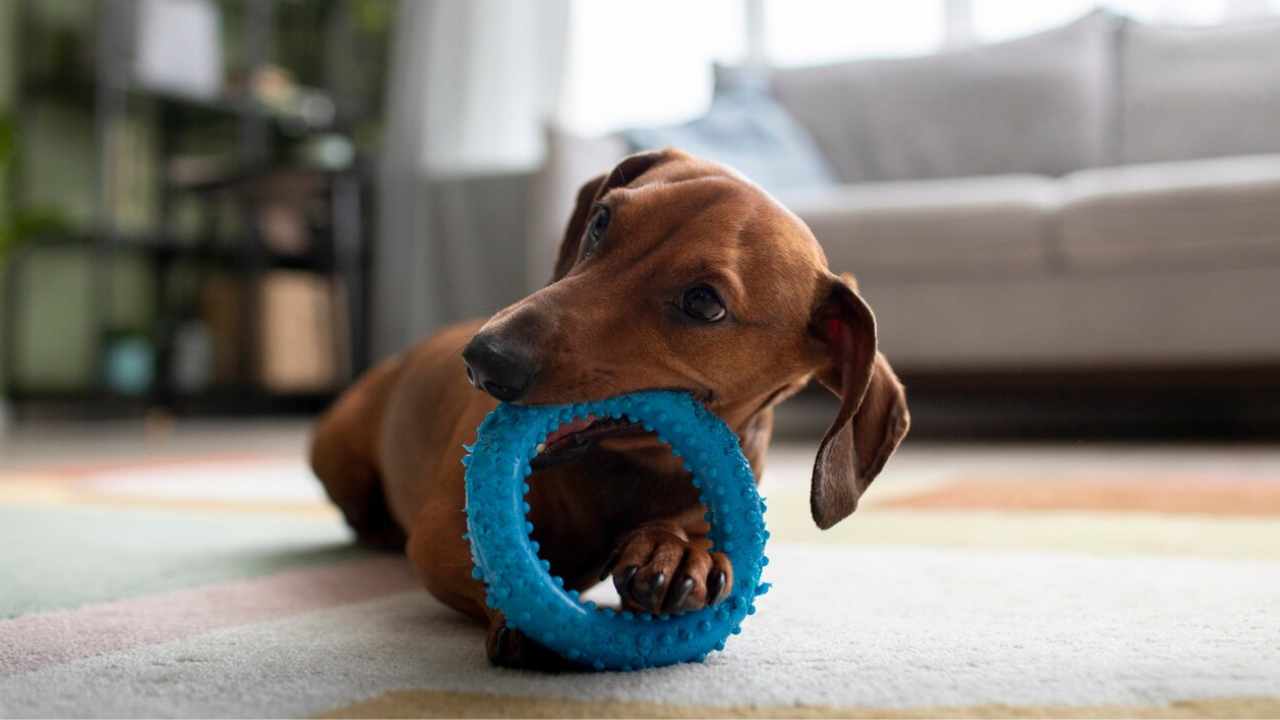
6. Enjoyment
Sometimes, the simplest explanation is that your dog enjoys chewing on their bed. The bed might have appealing textures, smells, and tastes that encourage this behaviour.
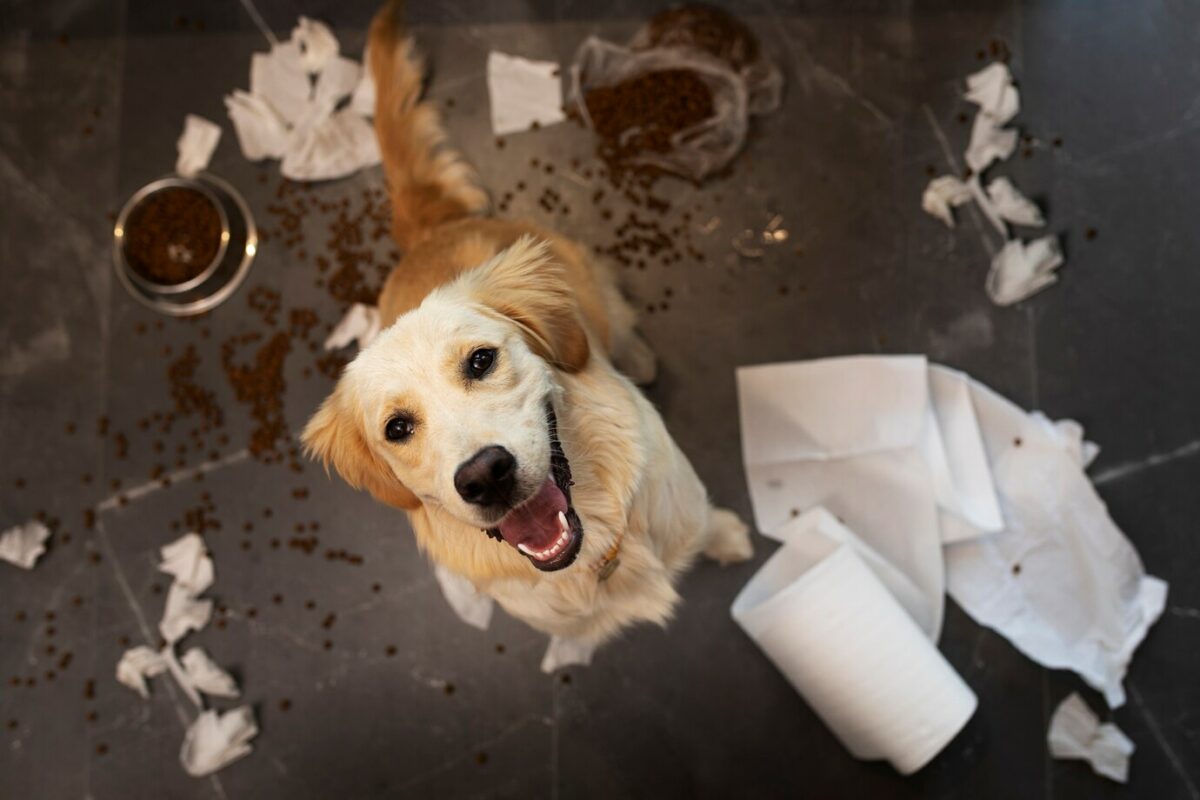
How to Prevent Dogs from Chewing Their Beds
The right approach to curb bed chewing will vary based on the underlying cause behind the behaviour. Visiting the vet is the first step if a medical issue is suspected. However, for other motivations, here are some proven tactics:
1. Exercise Your Dog

If boredom seems to be the culprit, upping daily exercise is key. Try adding an extra walk or extending playtime. A restless, frustrated dog clearly needs more physical activity.
Make sure your dog gets 30-60 minutes of vigorous exercise before being created to prevent pent-up energy from manifesting as destructive chewing. If your schedule makes this impossible, it’s also a good idea to look into a dog walker or sitter to give your pup a potty and play break.
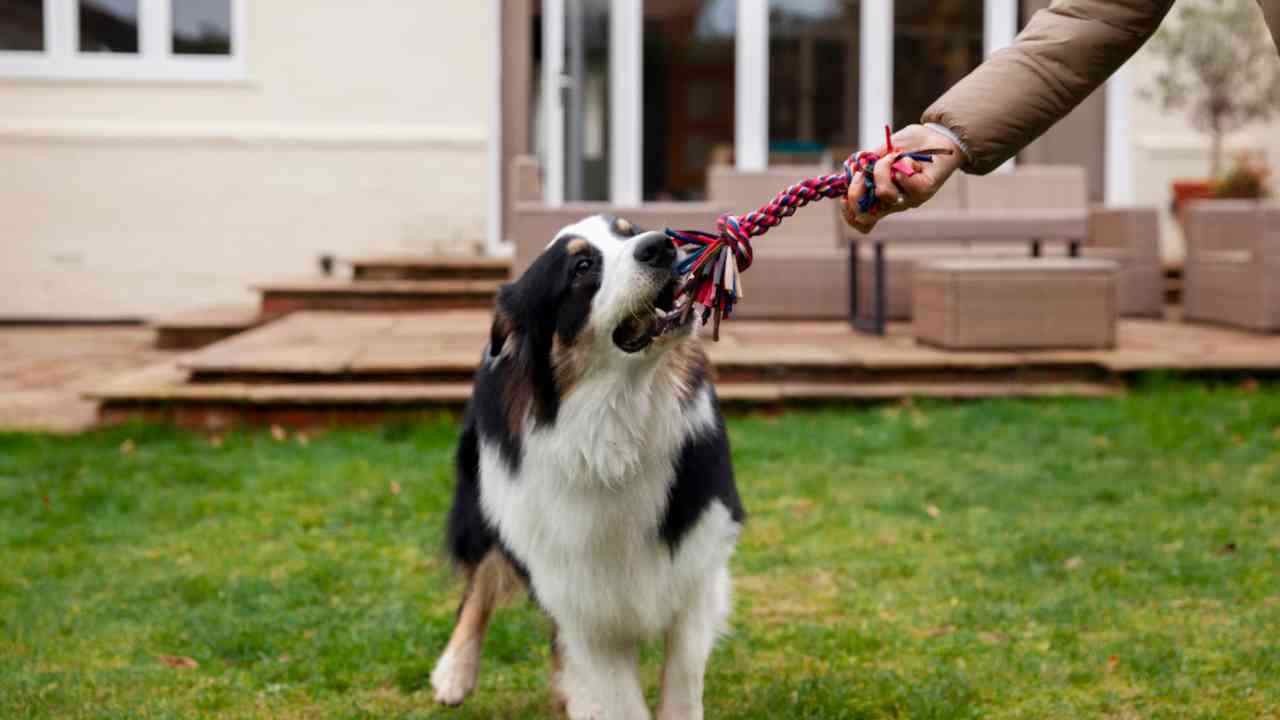
2. Introduce Enrichment Puzzle Toys for Your Dog
If you don’t have more time to walk the dog, I highly recommend turning to dog puzzle toys as a supplement. It’s fascinating to note that just 15 minutes of engaging your dog in brain-stimulating games can exhaust them more effectively than a half-hour walk.
SHOP NOW
Dog puzzles, like this spin bottle treat dispenser toy from Loobani, are fantastic for mitigating boredom and preventing unwanted behaviors by stimulating their natural instincts through scent work.
Remember, a dog doesn’t just have four legs that need physical exercise; they also have a brain that craves mental stimulation. These enrichment toys provide a challenging yet satisfying way to keep your dog’s mind sharp and instincts honed.
VIEW MORE
3. DIY Lick Mats
Like treat puzzle toys, lick mats are also an excellent enrichment tool to keep your dog engaged and mentally stimulated, which can help curb destructive behaviors like bed chewing.
These interactive feeding mats encourage your pup to use their natural foraging instincts, licking and lapping up treats or peanut butter smeared across the mat’s grooves.
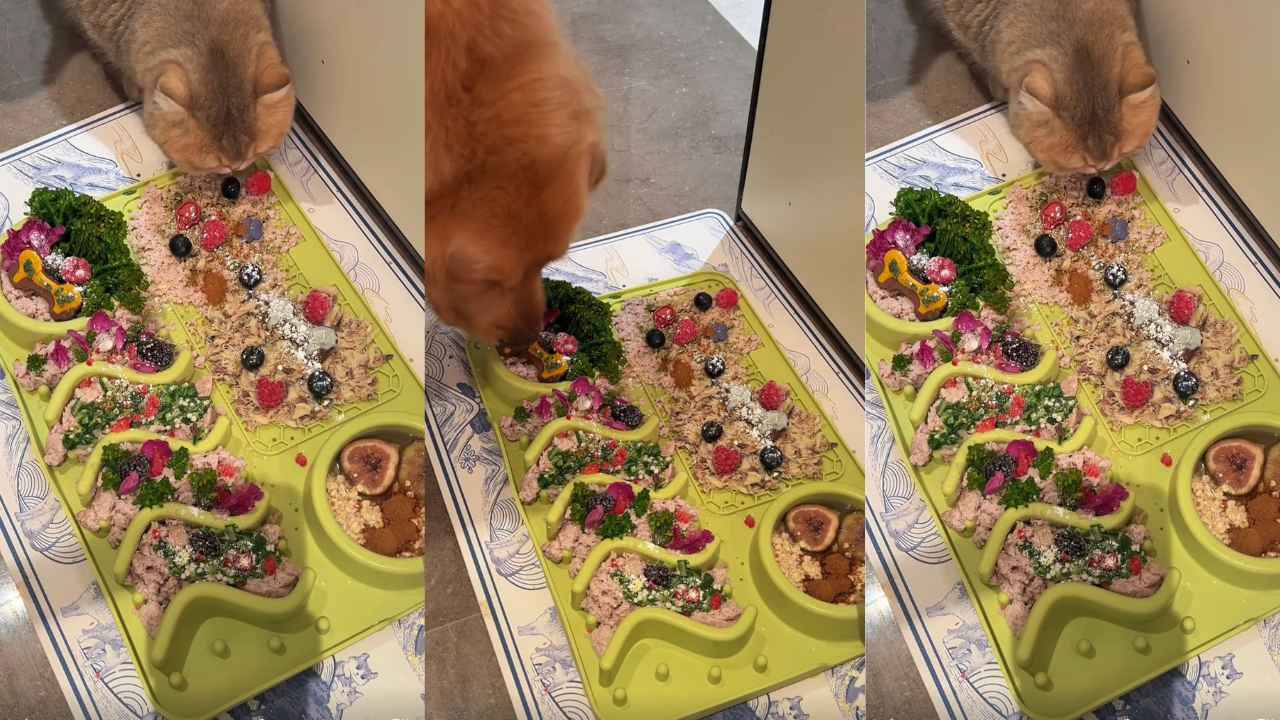
The Lickmat Revolution offers a variety of lick mat designs, from classic grooved mats to intricate puzzle shapes, providing your dog with an engaging challenge to work for their snacks. This slow feeding method not only helps alleviate boredom but also promotes calmness and focus, making it a fantastic option for dogs prone to anxious chewing.
4. Provide Chew Toys
To prevent unwanted chewing behaviouris, it’s also beneficial to provide your dog with a range of chew toys. This can include plush toys, interactive puzzle toys, rubber chews, and more, offering various options for your dog to channel their chewing instincts appropriately. Redirecting training, particularly for puppies, can also help establish positive chewing habits.
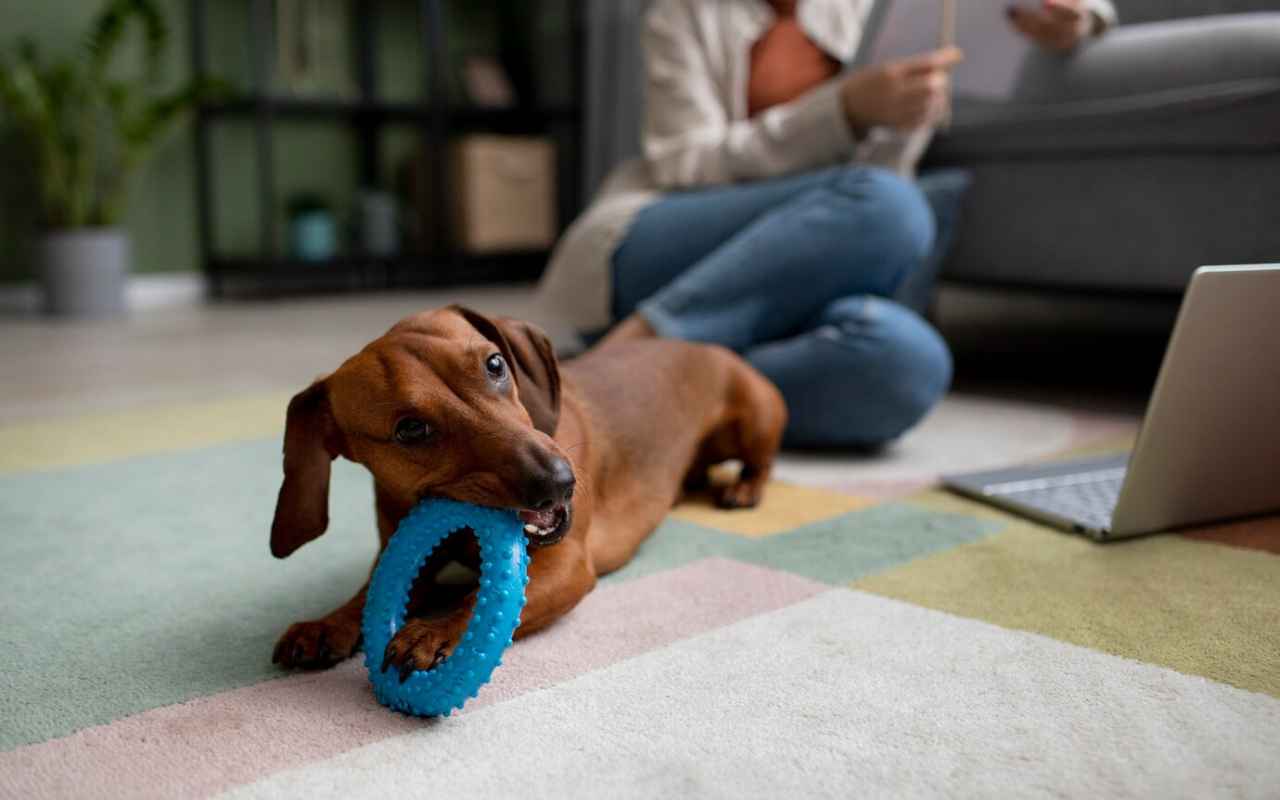
5. Use Deterrent Spray
A deterrent spray can be an effective short-term solution to discourage your dog from chewing on their bed. However, pairing a deterrent with other strategies is essential to keep your dog occupied and happy.
When introducing a deterrent, allow your dog to taste a small amount applied to cotton wool or tissue to create an aversion to the taste and smell. Apply the deterrent to the dog bed and other off-limits items regularly for two to four weeks.
But remember, deterrents alone are not a long-term solution; they should be used with other preventative measures.
6. Upgrade to a Chew-Resistant Dog Bed
If your dog keeps turning their bed into a chew toy, it’s probably time to invest in a chew-resistant dog bed. These specialized beds are a game-changer, designed with durability in mind to cater to the needs of persistent chewers. They’re constructed from robust materials that can take a beating, featuring multiple reinforced layers to ensure longevity.
This upgrade not only saves you from the endless cycle of replacing chewed-up beds but also provides your dog with a comfortable resting place they can enjoy without causing destruction.
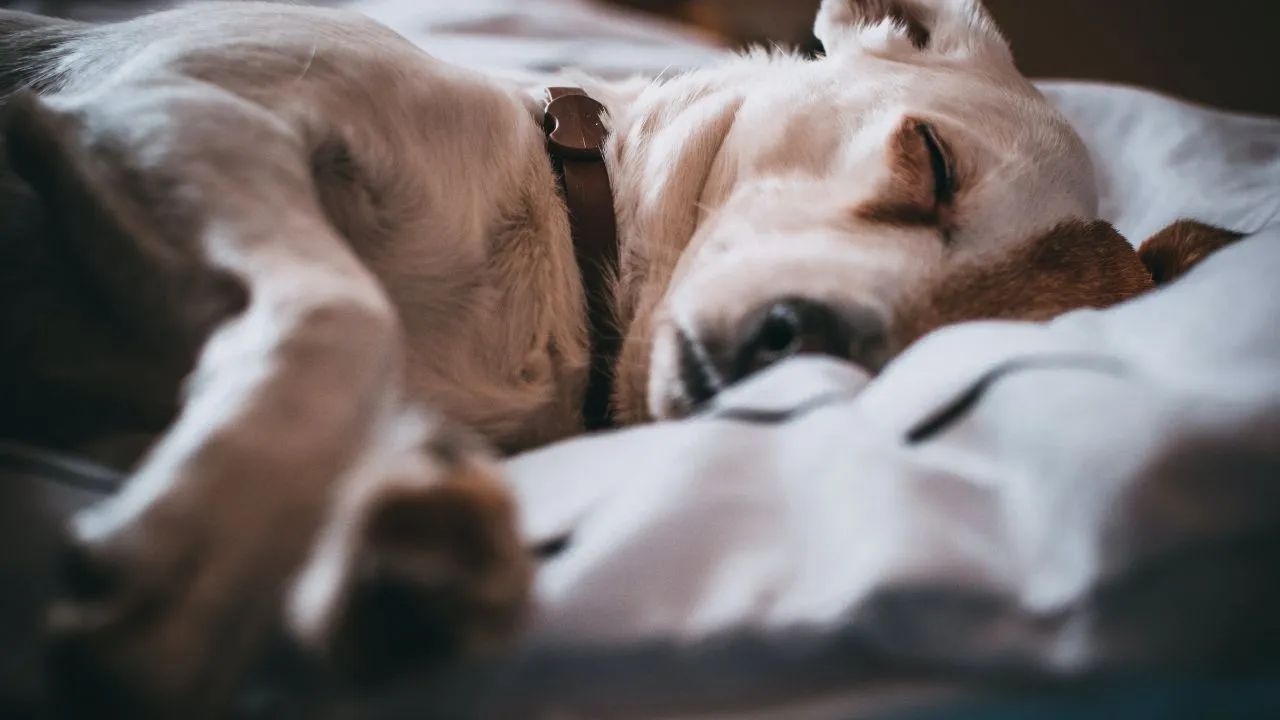
7. Understand Anxiety-Driven Chewing
If anxiety is at the root of your dog’s tendency to chew on their bed, a compassionate approach is key. It’s not uncommon for dogs to resort to destructive behaviors, such as bed chewing, when they’re dealing with separation anxiety or stress. Recognizing this, it’s important to understand that reprimanding or punishing your anxious dog could actually exacerbate the issue.
Instead of resorting to physical discipline, shouting, using muzzles, or other negative reinforcement methods—particularly with dogs experiencing severe anxiety—it’s crucial to address the problem with patience and a focus on alleviating their underlying anxiety.
8. Identify Stressors
Pinpoint potential triggers of anxiety to mitigate their impact. While you can’t control all external stressors, understanding what worries your dog allows you to create a calm environment. This could mean establishing boundaries with rowdy kids or pets, providing a quiet safe space during fireworks, or playing background noise to mask unsettling sounds.

9. Try Calming Pheromones
Consider using synthetic dog appeasing pheromone (DAP) products, which replicate the calming signals given off by mother dogs. Available in forms such as wipes, sprays, diffusers, and collars, these pheromones work to soothe anxious dogs.
Remember, consistent use is crucial for these products to be effective.
10. Explore Behavioral Therapy
For severe anxiety, consult your vet for referrals to certified specialists for appropriate behavioral treatment plans. A combination of training, environmental changes, and sometimes medication can help dramatically improve quality of life.

11. Use Soothing Background Noise
To help soothe your dog’s loneliness or anxiety when they’re home alone, consider using background noise like a TV or radio. Leaving them on can provide a comforting atmosphere.

Additionally, you might want to explore programming designed specifically to relax dogs, featuring gentle music or calming sounds, for an even more soothing effect.
Final Words
Stopping your dog from shredding his bed requires understanding the underlying motivation coupled with consistent training and management.
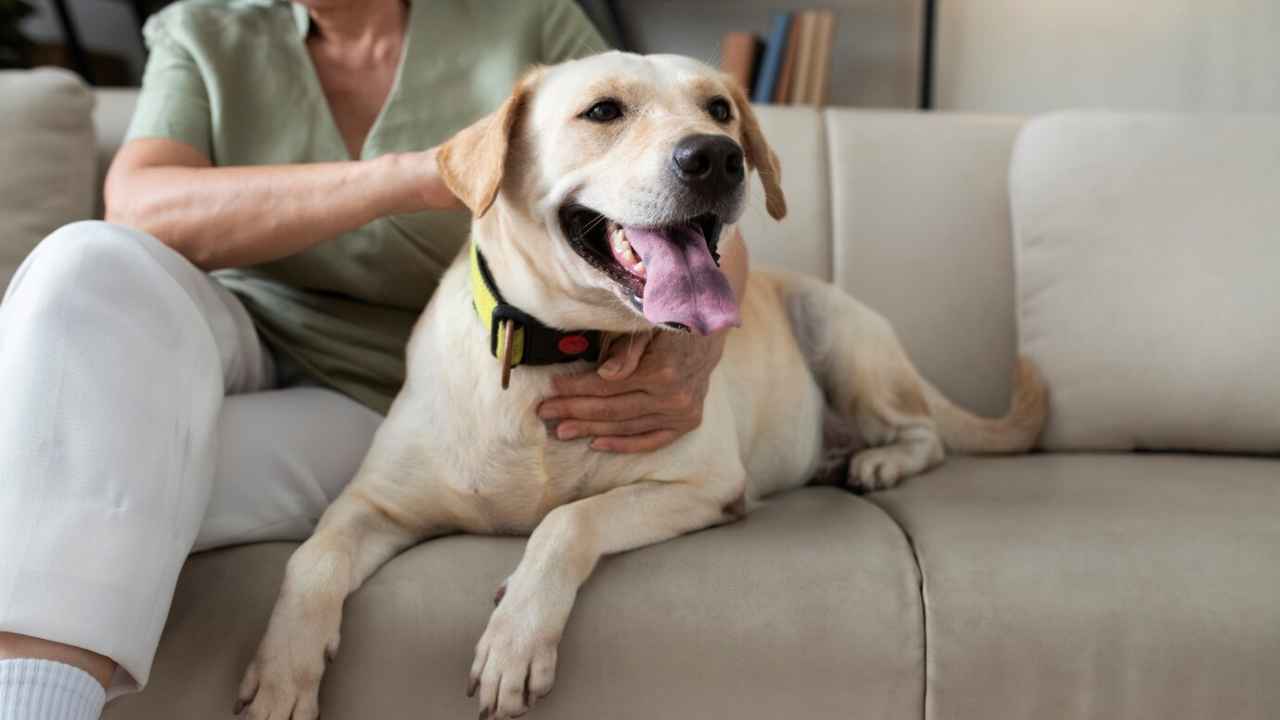
While preventing destructive chewing takes time and effort, the payoff of having a happy, well-adjusted dog is immeasurable. Approaching this common problem with patience and insight lays the groundwork for a positive resolution.